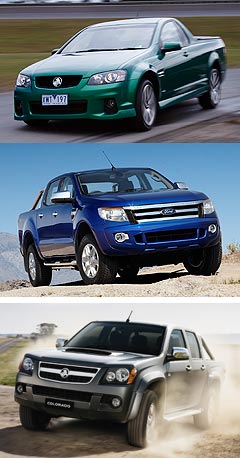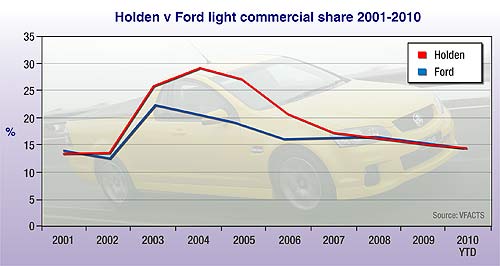Make / Model Search
News - General News - SalesFord and Holden slug it out in ute marketUte wars: Ford is on track to sell 9600 Falcon utes this year, compared with 12,000 Holden VE utes. Local manufacturers go down swinging in light truck battle for silver medal25 Oct 2010 FORD and Holden are locked in a familiar battle for second place in the Australian light commercial vehicle (LCV) market this year, with both clasping 14.5 per cent of sales with three months to go. After being pipped by Ford for the past two years running, Holden this year is holding a slim margin – 19,830 sales to Ford’s 19,799 – thanks to a wafer-thin 0.1 per cent increase compared with Ford’s 3.0 per cent decline in an overall segment that has risen 7.7 per cent year to date. Of course, both are vastly out-punched by long-time market leader Toyota, whose 42,771 sales – up 12.7 per cent – represent a dominant 31.3 per cent share of the segment. But of greater concern for both of the American-owned local manufacturers is the need to arrest their steep LCV sales decline over the past six years under the unremitting assault from a growing number of rivals from Japan, Korea, Europe and China.  From top: Holden VE Ute, Ford MY2011 Ranger, Holden Colorado. From top: Holden VE Ute, Ford MY2011 Ranger, Holden Colorado.In 2004, Ford and Holden together controlled almost 50 per cent of the Australian light truck and van market – Holden with 29.1 per cent and Ford with 20 per cent. Their locally made utes were flying, with Holden’s VY Commodore-based ute peaking at 22,374 sales, lifted by the born-again One-Tonner cab-chassis along with the crew-cab Crewman and its all-wheel-drive spin-off, the Cross8. In 2004, Ford’s Falcon Ute was also north of 20,000 units for the second year in a row. By last year, the Holden Ute – now minus the Crewman and One-Tonner variants that were dropped from production with the change to the VE Ute in late 2007 – had slid about 45 per cent to 12,106 sales. Likewise, its local rival had dived to an uncannily similar number – 12,180 units – achieved only with a huge 11th hour registration push by the Blue Oval in December, when Falcon Ute sales jumped almost 65 per cent over the corresponding month the year before. This year, Holden is expected to sell a similar number of its recently upgraded VE Series II utes – about 12,000 – but Ford’s local hero is down 14.7 per cent after nine months and only another heroic push towards December 31 could reverse that. At current pace, it is on track to achieve about 9600 units – less than half its volume of six years ago. Both companies are increasingly dependent on their ageing imported utes, which are both made in Thailand, along with most other one-tonners sold in this country. Holden’s Colorado (nee Rodeo) and Ford’s Ranger both have well-documented replacements in the pipeline for release in this country about 2012. Until then, it will be a matter of trying to make the most of what they have against an increasingly torrid competition, including a younger Toyota HiLux, Nissan’s split-range D22/D40 Navara, Mitsubishi’s Triton and – soon – the Volkswagen Amarok. Holden’s decline in LCV volumes has not been the sole fault of its Commodore ute. When Holden’s Isuzu-based Rodeo was new in 2004, its sales topped 24,000 units – about 2000 more than the Commodore load-lugger. This year, sales of the re-named but essentially similar Colorado are down almost 5.0 per cent on last year alone, and should see out 2010 on about 14,000 units. That’s still about 2000 units more than its local Commodore ute stablemate, but also represents a decline of almost 40 per cent over Rodeo in just six years. Some of those sales may have gone to the fledgling Isuzu Ute, which started up in opposition to former partner Holden with its own version of the Rodeo, the D-Max, after GM and Isuzu went their separate ways a couple of years ago. This year, Isuzu has sold 3659 D-Max utes – a gain of almost 70 per cent year to date – making it Australia’s second-fastest-growing LCV brand after Hyundai (+84.4 per cent). Speaking of Hyundai, the Korean importer has been another source of pain for the local companies, particularly Ford. While Hyundai does not have a ute – yet – its iLoad van is roaring up the charts, while Ford’s rival Transit has gone the other direction, down 30.9 per cent this year to 1292 units to the end of September. Volkswagen’s Transporter (+35.8 per cent) has also has a hand in this. Holden’s smaller Combo van is down 25 per cent, to 450 vehicles YTD, but its pain is mainly coming from other European-made mini delivery vans, including the Citroen Berlingo (+38.8 per cent) and Volkswagen Caddy (+2.9 per cent).  |
Click to shareGeneral News articlesResearch General News Motor industry news |









Facebook Twitter Instagram